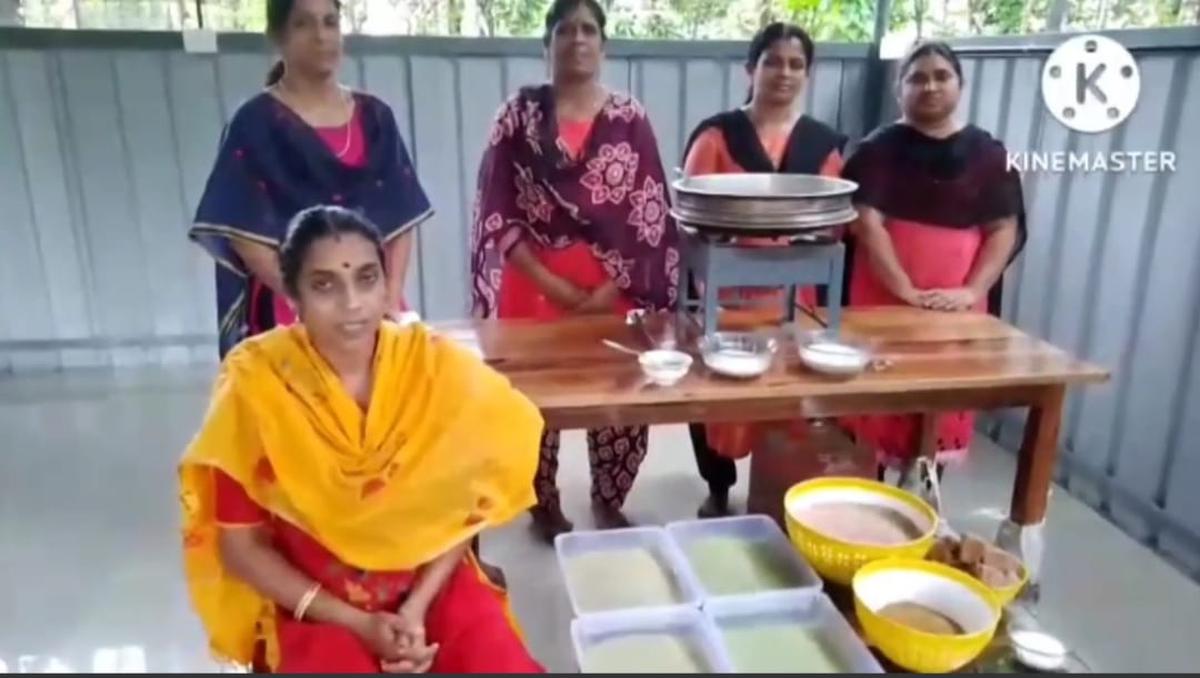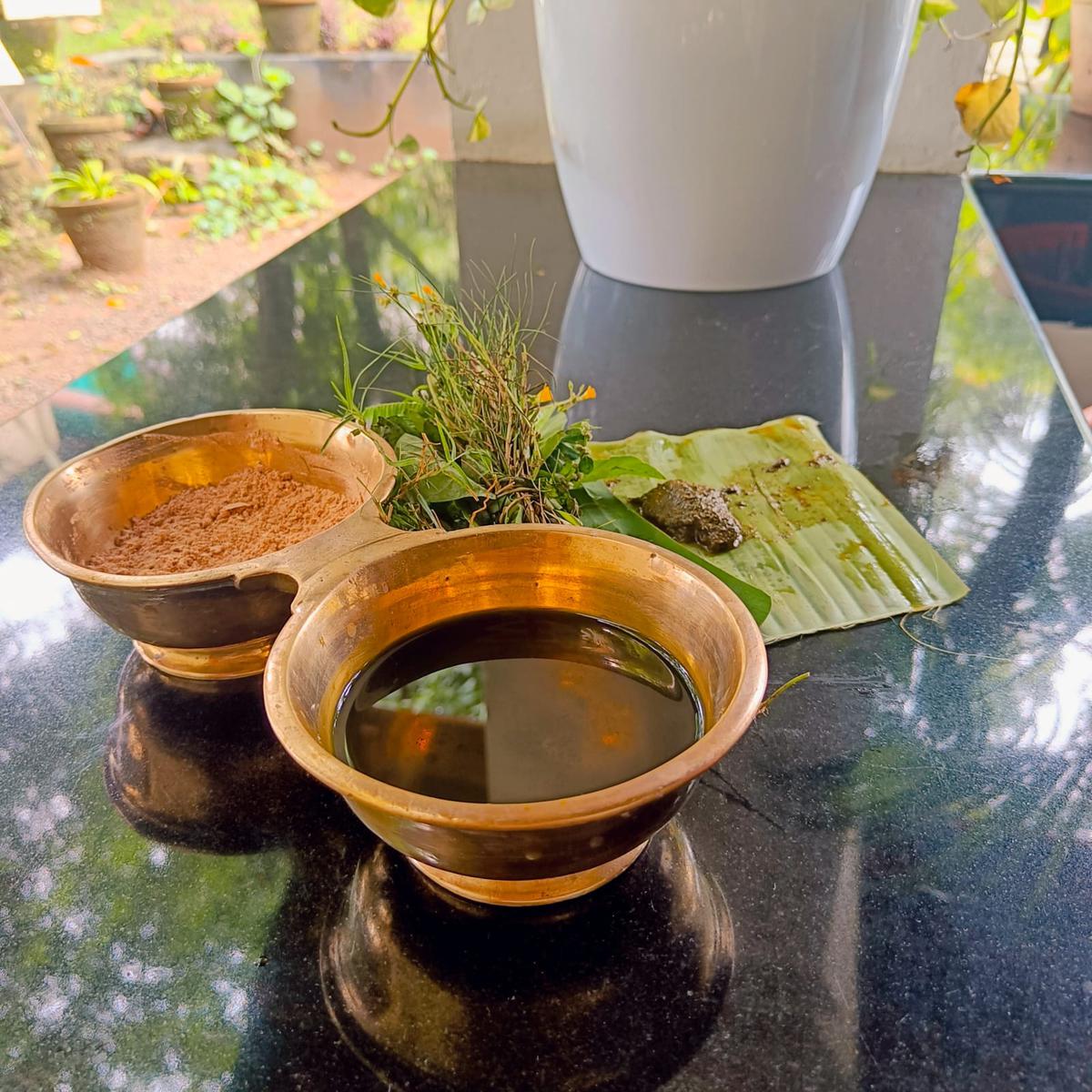Karkkadakam bathing rituals of Kerala, in a new package

Come mid-July, the skies in Kerala turn grey, the temperature drops and the rain falls without respite. It is the start of Karkkadakam, the last month of the Malayalam calendar. With farming coming to a halt and people forced indoors, the time is traditionally used to rejuvenate the body and mind.
Many traditional customs are associated with this period, like reading the Ramayana daily and following a strict diet. But the one ritual that Asha Devi Varma, a former agriculture officer and a member of the Poonjar Royal family recalls with much nostalgia is the Karkkadaka kuli or the ceremonial bath. “It was a big affair in the olden days,” says Asha, discussing how women soaked themselves in herbal oils and scrubbed it off with a homemade paste of wild turmeric at the pond at her maternal grandmother’s home in Tiruvalla.
Asha has been making and retailing these traditional oils and scrubs for the past six years from her home in Tripunithura, lest the recipes and customs be lost forever. “Our grandmothers bore many children and aged healthy, because of the pampering they gave their bodies during this month. It rejuvenates the bones, skin, and hair,” she says, explaining why she has introduced a Karkkadakam Bathing Hamper (₹600) in contemporary packaging this year, which includes hair and body oils, shampoo and scrub.
The hamper is a natural progression of what Asha has been doing small scale at home and for her friends and family. She has loyal clients, she says and retails them in ladies groups on social media. “As it is a Karkkdakam kit it is bought by women of all age groups,” she says adding that though she does not have a sales target yet, she has sold around 100 hampers this year. Asha home delivers the hampers with plans to market them professionally in the future.
For women, by women

Femlogix Enterprises Unit at Mullankolly in Wayanad, run by women
In Wayanad’s Mullankolly panchayat, Bindu Sathyajith set up a women empowerment unit, Femlogix Enterprises, and launched the Karkidakka Ayur Arogya Soundaraya this year primarily, “to pass on the traditional wellness knowledge to the next generation.”
The kit, ’Karkidakka Ayur Arogya Soundaraya’ costs ₹1399 and includes oils, scrub, herbal soap, herbal tea and coffee and medicinal gruel to be had an hour after the bath.
Fragrant hair
As it is difficult to dry the hair in monsoon, wet hair was spread over an upturned basket under which ashtagandha was burned and its fumes dried the hair. The fragrant smoke was also treatment for hair lice. Ashtagandha is a powder made from the leaves, roots and bark of eight fragrant plants.
Bindu, whose great-grandfather was a well-known Ayurveda expert, says she is the fifth generation to carry on the tradition. She cultivates about 14 plants and herbs required as ingredients for the oils and set up the unit during the pandemic when the farmers in the area were struggling to eke a livelihood. Some of the plants she grows are cheroola (mountain knotgrass), uzhinja (balloon plant), aruka (bermucla grass), nilampana (goldeneye grass), vishnu granthi (evolvulus), thiruthali (morning glory) and purvankurunthal (little iron weed)
Asha uses gingelly oil for the body and coconut oil for the hair. The scrub is made of Vetiver. Other products in her hamper are organic turmeric powder, virgin coconut oil with dandapaala (ivory wood), coconut milk shampoo and soap and the vetiver roots body scrubber.

Traditional scrub and oil vessel
Traditional knowledge
Dhanya Jathavedan started a woman’s-only Nagarjuna Stree Ayurveda Centre in Tripunithura, in 2017, to “pass on” the beauty and wellness regimen of her 95-year-old grandmother Hymavathy Thampuran to other women.
“The bath is seen as a cleansing ritual. In the olden days, women had regular oil baths on Tuesdays and Fridays, as they were said to be auspicious. A scrub made of tree bark, incha, and soap of areca nut powder, Vaga podi, was used instead of soap. “ Vaga podi was also prescription for women who had body odour,” says Dhanya adding that the shampoo of those times was Thali podi (Hibiscus leaf powder) that lathers and vitalizes the scalp. Lentil powder too was used as a body scrub. There was a special vessel to carry the oil and the body scrub powder. “It had two compartments,” recalls Dhanya.
According to her, there were different types of body oils, “depending upon the body structures”, but kaiuniyam (false daisy, bhringraj oil) was common. Once the bath was complete, rasnadi choornam — a powder made using several herbs like turmeric, pepper, sandalwood and leaves — would be applied on top of the head to prevent a cold.
A 150-year-old recipe
Bindu’s kit comes with a body scrub made of wild turmeric and payar podi or coarse lentil powder, a shoe flower organic soap, a tree bark loofah and mukkuti powder (biophytum) made from leaves and roots, which is applied on the forehead to prevent headache. The body oil is a 150-year-old recipe that uses ghee, turmeric, virgin coconut oil and gingelly oil. She also provides herbal tea, coffee and kanni and a moisturising cream made with wild turmeric and coconut oil. She says women should perform the ritual bath for seven, 14 or 21 days during the month.
Dr Radha Unnikrishnan, a diabetologist, who has been using Asha’s bathing hamper finds it “very handy” and is assured about the purity of the ingredients used. .She recalls her mother making the oils at home but she has no time for the tedious process.
“This month is for pampering our body and hair. The kit enables that easily,” she says.

